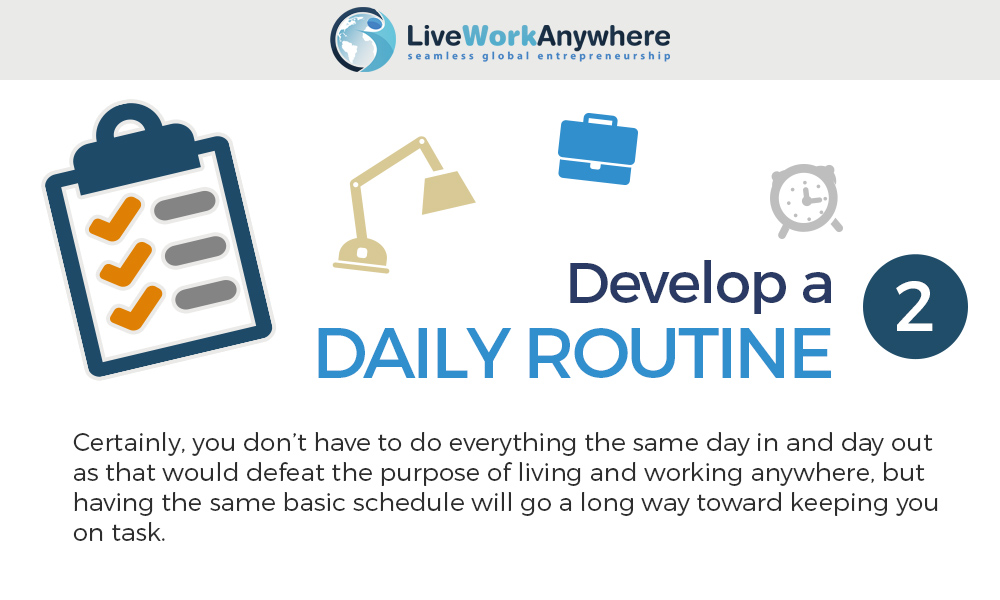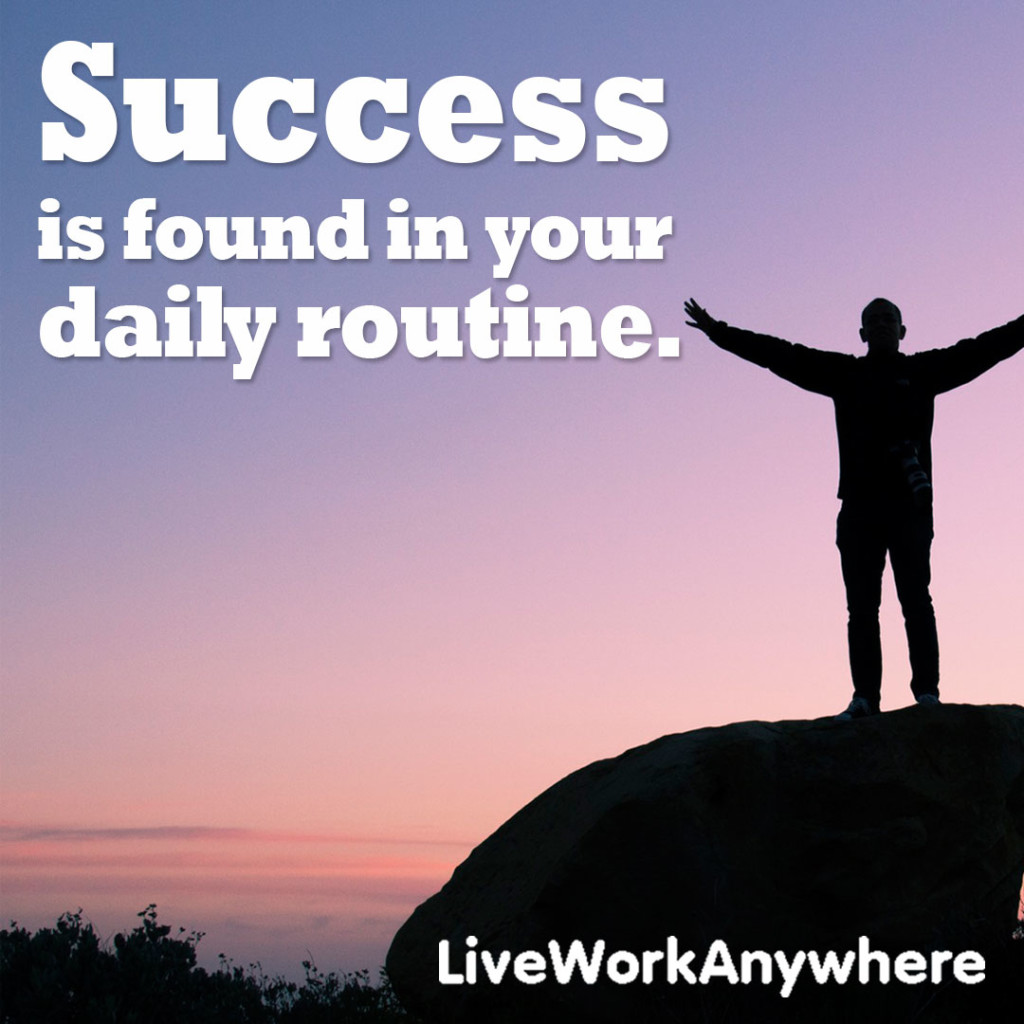Mobility Criteria #2: Creating a Daily Routine
Want to make a real difference in your life? You can and this begins with the actions that you take each day.
When you’re in the corporate world, your days all look relatively similar:
- Get up
- Get dressed
- Listen to the news
- Go to work
- Get coffee
- Check your email
- Go to a meeting at 10
- Have lunch at 12
- Go to another meeting at 2
- Go home at 5
However, they’re much different when you’re no longer in the corporate world because you get to dictate your own schedule when you work for yourself. This provides an overwhelming sense of freedom as you choose where to be and when. But… you might also feel a little lost. So, leaving the corporate world to work remotely requires that you establish a routine.
“Success is made in your daily routine.”
I remember when I left Adobe, trying to imitate my schedule each day. Wake up (well, roll out of bed and go to my desk), get coffee, and start working at 9 am. But, what was I supposed to work on, exactly? Should I create meetings? With whom? Should I eat lunch at 12?
I would stay up until 3 am sometimes doing work because, in my head, staying up late meant that I was being productive. But I never quite got momentum and I wasn’t sure where to focus.
I was burning the candle at both ends with unpredictable results.
It took years to learn how to establish a routine yet, looking back, I realize it’s the most important thing I’ve ever done. Creating a daily routine helps keep me focused, on track, and productive. Sure, you get to dictate your schedule, but it’s the details in your daily routine that matter.
Routine leads to success. Make your routine robotic and your life will become less chaotic. It sounds ironic, but adding discipline into your routine actually allows you to have more freedom.
What does my daily routine look like?
My Daily Routine
Though it may vary by location, especially as someone who travels around the world crossing different time zones and cultures, I have a routine that I follow each day.
My routine beings with waking up by 7:30, then exercise and meditation for 35 minutes minimum, and then setting milestones and reviewing them. If my schedule changes or I have to run out in the morning before exercising, I adjust. But I still get the most important things done.
Then, with a cup of black tea and a light breakfast, I sit down and get at it.
First – and very important – I write a to-do list. I just use Notepad or an equivalent. I’ve tried several other tools, but this one works for me and I always default to it. I think it’s because it’s quick and reliable and just easy to read.
Next, my to-do list must be prioritized and milestones set. This reduces the amount of stress I feel and really helps my focus and clarity.
I’ve actually written my routine down and taped it to my wall. I had a blue Sharpie and piece of typewriter paper. I wrote down everything I needed to do each day to keep myself on track (even feeding my cat and brushing my teeth – not kidding) and I pinned it to my door.
Here’s what my blue Sharpie’s list looked like:
- Get up by 7:30
- Feed Jack
- Brush teeth
- Eat small snack
- Go to the gym
- Work out for 35 minutes, burn a minimum of 500 calories
- Eat blend of protein and carbs, low caffeine (exercise replaces caffeine)
- Start work by 9 am
- Set milestones
- Review schedule
- Make calls 10 am – 2 pm
- Take a break at 2 pm go for a walk to energize
- 3-5 pm for afternoon meetings
- 5 pm take a break
- Have dinner at 6 pm and spend time with family / friends
- 7-9 pm go for a walk and spend time with family / friends
- 9-11:30 pm prepare for the following day
- Read something inspirational before falling asleep
Of course, life doesn’t always happen on autopilot, but what I am doing is forcing myself to create a schedule and stick to it.
Creating Your Own Daily Routine
Although this is what I do, don’t overlook the importance of establishing your own routine.
I suggest you come up with your own routine and write it down. I prefer not to waste paper and to have everything in one spot, so I use Notepad or TextEdit on Mac to store my daily milestone list. But come up with what works best for you.
I do want to note that there are a ton of productivity tools out there (Evernote, Reminder List, and tons of apps). Not that these aren’t good tools, but to manage yourself and your daily routine, you really just need something simple. By the time you learn to use a ‘tool,’ you will have wasted time you could have spent taking care of 5 items from your list. Notepad is just quick and what I call an anti- procrastinator.
(Note: Writing on a physical notepad works even better for committing thoughts to memory via the electromagnetic impulses in your fingers.)
Now, just do the routine for the habit-forming 21 days and you will start to do it without thinking. If you get off track, go back to your note.
But the important thing is, don’t delay. Create your list – and follow it.
With a posted routine, can you still be spontaneous? Yep. Can you go to your daughter’s soccer game? Yep. Just prepare your schedule in advance so you can arrange and rearrange and plan around it.
But most important is setting aside time to create and check in. Healthy body and healthy mind are of utmost importance. Find 4 hours per day. It doesn’t matter if you’re in Venice. You can find 4 hours to keep yourself on track.
Also, monitor what you do in your spare time. It’s good to be spontaneous but what you do in your spare time, how you choose to spend your time and with whom, is an indicator of your success.
We’ll get into more later about your routine and dissect your day but, for now, just remember routine is key. It may sound robotic but it’s a way to build routine into your day and to manage yourself and your life.
Go back to that list, often! Check in with yourself.
Tips for Daily Routine Success
Once you’ve established a routine, scripted it out, and learned how to have the discipline to follow your script, it helps to do some other things to help make the process easier.
Some of my best tips for daily routine success include:
- Go to bed early. Early to bed, early to rise. This keeps you out of trouble and helps you stay focused and fresh. The first thoughts of the day are most important.
- Get 7 to 8 hours of sleep each night. Do not try to be a ‘useless hero‘. Get sleep every night. Good sleep. It makes a huge difference. Burning yourself out helps no one.
- Exercise each day. Make this the first thing you do each morning (instead of drinking coffee). Aim for 35 minutes minimum, shortly after you wake up. No excuses. Do it for 21 days and you’ll notice the difference. Remember: Your physical health feeds your mental health. For me, this involves taking a walk, after which I am able to sit down, make a list of my milestones, and bust out the next 4-5 hours of hard, focused work.
- Meditate each day. Some people prefer to meditate upon waking up. For me, this doesn’t work. Instead, I meditate and prepare for the coming day during my daily morning walk or exercise because this is when my mind is most open to creative ideas and better able to focus. During the day, when my mind needs a break from stress or fatigue, I take another walk or listen to a meditation app and take the time to slow my heart rate and mind.
- Study each day. What you feed your mind is critical. Listen to audiobooks or read on Kindle. Consider business books or think about new skills you want to learn or practice. Reading in the morning stimulates creativity for later in the day and reading before you go to bed helps the mind stay focused and learning while you sleep. Steven Covey says that everything we know has a half-life of two years, so you must constantly be upgrading and sharpening your skills if you want to stay on top of your game and keep your business competitive.
- Break tasks into milestones. As you’ve learned in the milestones post, you want to break your tasks into achievable chunks. Then, accomplish those tasks. If one takes too long, break it into smaller, more achievable tasks.
- Think through your workflow. Think through your milestones in your head before you even sit down to produce. Envision yourself having a successful day. Visualize yourself accomplishing your milestones. Then execute like a boss.
- Put a time limit on tasks. Forced deadlines help you get focused. That’s why it is beneficial to time yourself. Can you get that project done in 30 minutes? Try it. Do the best you can.
- Don’t be a perfectionist. Perfectionists tend to either get termed lazy or uptight – neither of which is going to help you. Instead, set deadlines to let go of the sense of “perfect makes done.” DONE makes done. The more you time yourself to get things done in a limited period of time, the better you’ll train yourself over time to produce – and in a way that is satisfactory to you.
- Practice self-discipline. The most important aspect of being an entrepreneur, especially a traveling entrepreneur, is self-discipline. It is the ability to make yourself do what you should do, when you should do it, whether you feel like it or not. Follow your list. If you have an off day, it’s okay. Just don’t let it turn into two days. Get up and get back in routine as quickly as possible.
- Extinguish negativity. You only have so many hours in the day. Don’t get caught up in drama or in things that won’t move you forward. Don’t let other people, especially negative people, rule your thoughts during your day. Every second of the day belongs to you; it is your time, choose it carefully and selfishly. If you do have to interact with negativity, prep yourself beforehand and decide how you’ll handle the situation, how you’ll steer yourself back into focus. A little mental preparation before a tough situation can have a very powerful effect on the outcome.
Overnight successes take years on average. What every success story has in common is commitment. Never give up, ever.
Success is made in your daily routine.
This is one of 15 articles, each one addressing the 15 different mobility criteria necessary to live and work anywhere. To learn more about the remaining mobility criteria, click here.


